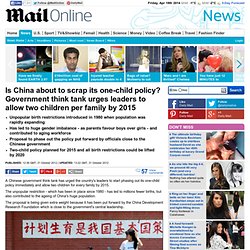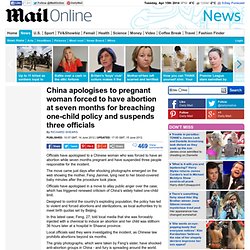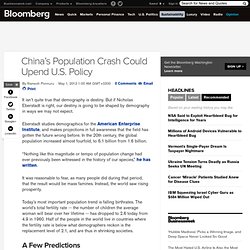

Is China about to scrap its one-child policy? Government think tank urges leaders to allow two children per family by 2015. Unpopular birth restrictions introduced in 1980 when population was rapidly expandingHas led to huge gender imbalance - as parents favour boys over girls - and contributed to aging workforceProposal to phase out the policy put forward by officials close to the Chinese governmentTwo-child policy planned for 2015 and all birth restrictions could be lifted by 2020 Published: 12:36 GMT, 31 October 2012 | Updated: 13:22 GMT, 31 October 2012 A Chinese government think tank has urged the country's leaders to start phasing out its one-child policy immediately and allow two children for every family by 2015.

The unpopular restriction - which has been in place since 1980 - has led to millions fewer births, but also contributed to the ageing of China's huge population. The proposal is being given extra weight because it has been put forward by the China Development Research Foundation which is close to the government's central leadership. Choice: Chinese women walk their babies in a park in Beijing. China: The rise of the 'Precious Snowflakes' Outrage as China 'forces seven month pregnant woman to have abortion for breaching one-child policy' By Richard Shears Published: 10:37 GMT, 14 June 2012 | Updated: 17:35 GMT, 15 June 2012 Officials have apologised to a Chinese woman who was forced to have an abortion while seven months pregnant and have suspended three people responsible for the incident.

The move came just days after shocking photographs emerged on the web showing the mother, Feng Jianmei, lying next to her blood-covered baby minutes after the procedure took place. Officials have apologised in a move to allay public anger over the case, which has triggered renewed criticism of China's widely hated one-child limit. China’s Population Crash Could Upend U.S. Policy. It isn’t quite true that demography is destiny.

But if Nicholas Eberstadt is right, our destiny is going to be shaped by demography in ways we may not expect. Eberstadt studies demographics for the American Enterprise Institute, and makes projections in full awareness that the field has gotten the future wrong before. In the 20th century, the global population increased almost fourfold, to 6.1 billion from 1.6 billion. “Nothing like this magnitude or tempo of population change had ever previously been witnessed in the history of our species,” he has written. It was reasonable to fear, as many people did during that period, that the result would be mass famines. Today’s most important population trend is falling birthrates.
A Few Predictions In the U.S., we are accustomed to thinking about how this trend affects the welfare state: Longer lives and fewer children make it harder to finance retirement programs. China’s Challenges China, notoriously, has another demographic challenge.